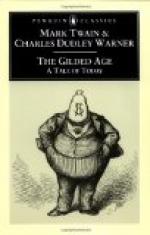Nothing that he remembered. Did he accompany her to a reception at Mrs. Shoonmaker’s a day or two before? Yes. What occurred? Little by little it was dragged out of the witness that Laura had behaved strangely there, appeared to be sick, and he had taken her home. Upon being pushed he admitted that she had afterwards confessed that she saw Selby there. And Washington volunteered the statement that Selby, was a black-hearted villain.
The District Attorney said, with some annoyance; “There—there! That will do.”
The defence declined to examine Mr. Hawkins at present. The case for the prosecution was closed. Of the murder there could not be the least doubt, or that the prisoner followed the deceased to New York with a murderous intent: On the evidence the jury must convict, and might do so without leaving their seats. This was the condition of the case two days after the jury had been selected. A week had passed since the trial opened; and a Sunday had intervened.
The public who read the reports of the evidence saw no chance for the prisoner’s escape. The crowd of spectators who had watched the trial were moved with the most profound sympathy for Laura.
Mr. Braham opened the case for the defence. His manner was subdued, and he spoke in so low a voice that it was only by reason of perfect silence in the court room that he could be heard. He spoke very distinctly, however, and if his nationality could be discovered in his speech it was only in a certain richness and breadth of tone.
He began by saying that he trembled at the responsibility he had undertaken; and he should, altogether despair, if he did not see before him a jury of twelve men of rare intelligence, whose acute minds would unravel all the sophistries of the prosecution, men with a sense, of honor, which would revolt at the remorseless persecution of this hunted woman by the state, men with hearts to feel for the wrongs of which she was the victim. Far be it from him to cast any suspicion upon the motives of the able, eloquent and ingenious lawyers of the state; they act officially; their business is to convict. It is our business, gentlemen, to see that justice is done.
“It is my duty, gentlemen, to untold to you one of the most affecting dramas in all, the history of misfortune. I shall have to show you a life, the sport of fate and circumstances, hurried along through shifting storm and sun, bright with trusting innocence and anon black with heartless villainy, a career which moves on in love and desertion and anguish, always hovered over by the dark spectre of insanity—an insanity hereditary and induced by mental torture,—until it ends, if end it must in your verdict, by one of those fearful accidents, which are inscrutable to men and of which God alone knows the secret.




